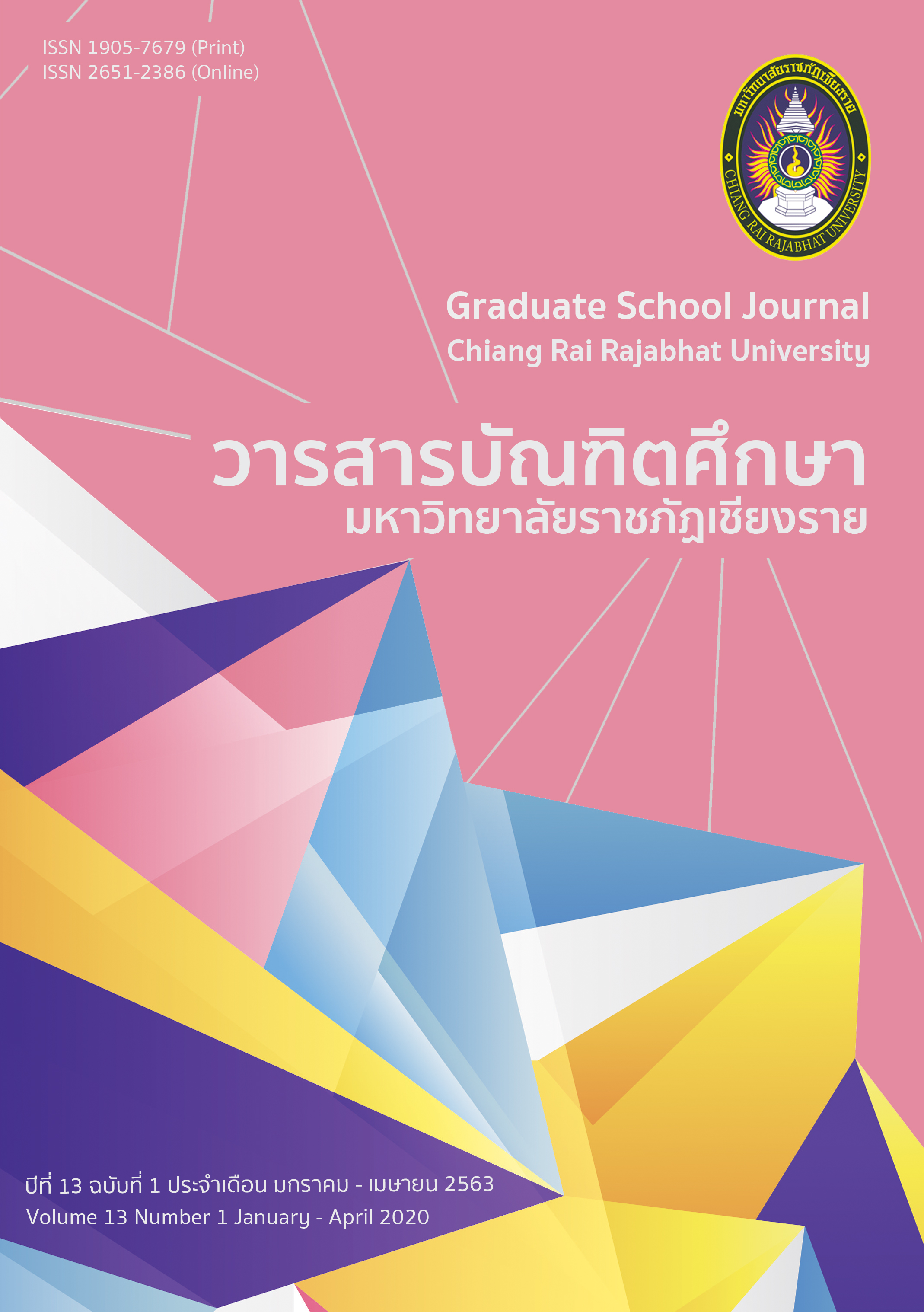กลยุทธ์การพัฒนาภาวะผู้นำด้านนวัตกรรมของผู้บริหารโรงเรียนประถมศึกษา สังกัดสำนักงานคณะกรรมการการศึกษาขั้นพื้นฐาน พื้นที่สำนักงานศึกษาธิการภาค 13
Main Article Content
บทคัดย่อ
การวิจัยครั้งนี้มีจุดประสงค์เพื่อ 1) ศึกษาสภาพปัจจุบันและความต้องการการพัฒนาภาวะผู้นำ ด้านนวัตกรรมของผู้บริหารโรงเรียนประถมศึกษา 2) สร้างและพัฒนากลยุทธ์การพัฒนาภาวะผู้นำ ด้านนวัตกรรมของผู้บริหารโรงเรียนประถมศึกษา 3) ประเมินกลยุทธ์การพัฒนาภาวะผู้นำด้านนวัตกรรม ของผู้บริหารโรงเรียนประถมศึกษา สังกัดสำนักงานคณะกรรมการการศึกษาขั้นพื้นฐาน พื้นที่สำนักงานศึกษาธิการภาค 13
กลุ่มตัวอย่างที่ใช้ในการวิจัยเป็นผู้บริหารโรงเรียนประถมศึกษา กำหนดขนาดกลุ่มตัวอย่างโดยใช้สูตรของ Taro Yamane ได้จำนวน 346 คน แล้วใช้การสุ่มแบบแบ่งชั้น (Stratified Random Sampling) เครื่องมือที่ใช้ในการเก็บรวบรวมข้อมูลใช้แบบสอบถาม แบบสัมภาษณ์ แบบบันทึกการสนทนากลุ่ม และ แบบประเมินกลยุทธ์ วิเคราะห์ข้อมูลโดยใช้โปรแกรมสำเร็จรูป สถิติที่ใช้ ได้แก่ ค่าความถี่ ร้อยละ ค่าเฉลี่ย ค่าส่วนเบี่ยงเบนมาตรฐาน และการวิเคราะห์เนื้อหา
ผลการวิจัย พบว่า
1. สภาพปัจจุบันการพัฒนาภาวะผู้นำด้านนวัตกรรมของผู้บริหารโรงเรียนประถมศึกษา สังกัดสำนักงานคณะกรรมการการศึกษาขั้นพื้นฐาน พื้นที่สำนักงานศึกษาธิการภาค 13 พบว่า ในภาพรวมอยู่ในระดับมาก ส่วนความต้องการการพัฒนาภาวะผู้นำด้านนวัตกรรมของผู้บริหารโรงเรียนประถมศึกษา พบว่า อยู่ในระดับมากที่สุด ทั้ง 5 ด้าน คือ ด้านแรงจูงใจ ด้านมนุษยสัมพันธ์ ด้านความคิดสร้างสรรค์ ด้านการเรียนรู้ และด้านบทบาทหน้าที่
2. กลยุทธ์การพัฒนาภาวะผู้นำด้านนวัตกรรมของผู้บริหารโรงเรียนประถมศึกษา สังกัดสำนักงานคณะกรรมการการศึกษาขั้นพื้นฐาน พื้นที่สำนักงานศึกษาธิการภาค 13 มีองค์ประกอบ 5 กลยุทธ์ ประกอบด้วย 1) ส่งเสริมการสร้างแรงจูงใจในการใช้นวัตกรรมสู่การจัดการเรียนรู้ยุคใหม่ โดยเน้นให้ผู้บริหารชื่นชมยินดี ยกย่อง เชิดชูเกียรติแก่บุคลากรที่ประสบความสำเร็จด้านวัตกรรม 2) ส่งเสริมการสร้าง มนุษยสัมพันธ์ในการสร้างความร่วมมืออย่างสร้างสรรค์โดยเน้นให้ผู้บริหารมีการสื่อสารที่ดีทั้งในและนอกโรงเรียน 3) ส่งเสริม สนับสนุนความคิดสร้างสรรค์ นำไปสู่การพัฒนางานให้ทันสมัยอยู่เสมอ โดยเน้นให้ผู้บริหารคิดค้นริเริ่มทำสิ่งใหม่อย่างสม่ำเสมอ ไม่ยึดติดกับกรอบงานหรือวิธีการทำงานรูปแบบเดิม 4) เพิ่มศักยภาพการเรียนรู้นวัตกรรมในการบริหารจัดการศึกษาให้ประสบผลสำเร็จ โดยเน้นให้ผู้บริหารพัฒนาทักษะ การแสวงหาความรู้เพื่อพัฒนางานอย่างต่อเนื่อง และ 5) ปรับปรุงและพัฒนาบทบาทหน้าที่ในการบริหารจัดการศึกษาอย่างมีประสิทธิภาพ โดยเน้นให้ผู้บริหารนำนวัตกรรมมาใช้ในการวางแผนการบริหารจัดการได้อย่างเป็นระบบ
3. ผลการประเมินกลยุทธ์การพัฒนาภาวะผู้นำด้านนวัตกรรมของผู้บริหารโรงเรียนประถมศึกษา สังกัดสำนักงานคณะกรรมการการศึกษาขั้นพื้นฐาน พื้นที่สำนักงานศึกษาธิการภาค 13 พบว่า มีความสมบูรณ์ ครอบคลุมส่วนประกอบ ได้แก่ วิสัยทัศน์ พันธกิจ ประเด็นกลยุทธ์ เป้าประสงค์ ตัวชี้วัดความสำเร็จ และมาตรการสู่ความสำเร็จ มีลักษณะเป็นกลยุทธ์ที่ดี โดยมีความสอดคล้อง ความเหมาะสม ความเป็นไปได้ และการใช้ประโยชน์ โดยภาพรวมอยู่ในระดับมากที่สุด
Article Details
บทความที่ได้รับการตีพิมพ์เป็นลิขสิทธิ์ของวารสารมหาวิทยาลัยราชภัฎเชียงราย
ข้อความที่ปรากฏในบทความแต่ละเรื่องในวารสารวิชาการเล่มนี้เป็นความคิดเห็นส่วนตัวของผู้เขียนแต่ละท่านไม่เกี่ยวข้องกับมหาวิทยาลัยราชภัฎเชียงราย และคณาจารย์ท่านอื่นๆในมหาวิทยาลัยฯ แต่อย่างใด ความรับผิดชอบองค์ประกอบทั้งหมดของบทความแต่ละเรื่องเป็นของผู้เขียนแต่ละท่าน หากมีความผิดพลาดใดๆ ผู้เขียนแต่ละท่านจะรับผิดชอบบทความของตนเองแต่ผู้เดียว
เอกสารอ้างอิง
จำเริญ อุ่นแก้ว. (2556). สถิติขั้นสูงเพื่อการวิจัย. ศรีสะเกษ: มหาวิทยาลัยราชภัฏศรีสะเกษ.
บุญชม ศรีสะอาด. (2556). การวิจัยเบื้องต้นฉบับปรับปรุงใหม่. (พิมพ์ครั้งที่9). กรุงเทพฯ: สุวีริยาสาส์น.
สำนักงานคณะกรรมการการศึกษาขั้นพื้นฐาน. (2559). ปฏิรูปการศึกษาพัฒนากระบวนการเรียนรู้เสริมสร้างศักยภาพครูสู่คุณภาพผู้เรียน. กรุงเทพฯ: สำนักงานฯ.
สุกัญญา แช่มช้อย. (2553). แนวคิดเชิงนวัตกรรมสำหรับการบริหารสถานศึกษาในศตวรรษที่ 21. วารสารศึกษาศาสตร์ มหาวิทยาลัยนเรศวร, 14(2), 128.
อรอนงค์ โรจน์วัฒนบูลย์. (2553). การพัฒนาตัวแบบผู้นำเชิงนวัตกรรม. (วิทยานิพนธ์ปริญญารัฐประศาสนศาสตรดุษฎีบัณฑิต). สถาบันบัณฑิตพัฒนบริหารศาสตร์. กรุงเทพฯ.
Weiss, S. Davic and Legand, P. Claude. (2011). Innovative intelligence. Ontario: John Wiley & Sons.


